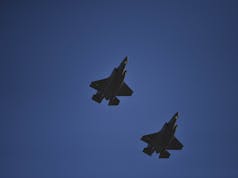Raytheon Company and Black Sage are now partnering to provide an integrated drone detection and mitigation system for civil authorities.
“As we saw at Gatwick and Heathrow airports, drones operating inside commercial air corridors are posing a real challenge,” said Todd Probert, vice president of Raytheon Intelligence, Information and Services.
“And though Raytheon has developed a range of counter-drone systems, from missiles to lasers to high-powered microwaves, authorities also need a system that can safely stop and land a drone where it may not be safe to shoot them down. That’s why we’ve teamed with Black Sage on a solution safe enough to operate in a populated area.”
To defend urban environments, like airports and cities, against drones, Black Sage’s sensors, AI, and radio-frequency jammers have been integrated into Raytheon’s Windshear command and control system. The firms say that this combined system allows a single operator to control a network of sensors and effectors that safely and quickly track, take over or land drones flying where they shouldn’t.
Though the integrated system is designed primarily for urban environments, the firm say that the systems are rugged enough to operate at even the most remote military bases.
“Together we address a diverse range of customer missions combining some of the deepest and strongest capabilities in the industry,” said Dave Romero, managing partner at Black Sage.
“Customers now have access to an unprecedented and complete kill-chain; one that can be deployed as narrowly or broadly as the mission requires.”













We’ve been here before, and for me, nothing has changed. From the start of high street sales of drones, strict flying laws and built-in flight envelopes, should have placed tight limits on their operation. My first thought was the delivery of noxious substances on civilian targets such as football stadiums and the like. After the Gatwick debacle, where all the arguments as to their free use and low threat risks, just melted away. If I’m being a touch hyper, just ask any commuter what they thought about the authorities preparedness? The majority of drones are operated sensibly and are a great filming tool, it’s just the minority who screw it for the rest.
A drone with Ricin flown into a full Wembley spreading the deadly toxin could kill tens of thousands. We need anti drone tech at all places like that.
Such a scenario is not out of the question, and we should have placed controls from the first day such craft were issued for public sale. Sadly, that was too slow in coming and now there must be a lot of backroom work to find effective methods of interception? I’m not being a killjoy, but aerial delivery will possibly be the new method of receiving goods, in a few years time. This needs to be achieved with tight but realistic legislation to ensure it’s as safe as possible. The drone is the future, but it should not become a terrorist weapon of choice.
Yeah agree, isis likes to drop mortars and bombs from drones…